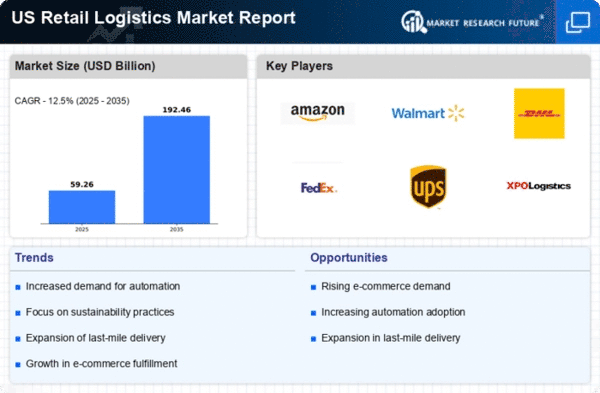E-commerce Growth
The rapid expansion of e-commerce is a primary driver of the retail logistics market. As consumers increasingly prefer online shopping, the demand for efficient logistics solutions intensifies. In 2025, e-commerce sales in the US are projected to reach approximately $1 trillion, representing a growth of around 15% from the previous year. This surge necessitates advanced logistics strategies to manage inventory, warehousing, and distribution effectively. Retailers are compelled to invest in technology and infrastructure to meet consumer expectations for fast and reliable delivery. Consequently, the retail logistics market is experiencing heightened competition, prompting companies to innovate and streamline their operations to capture a larger share of the growing e-commerce segment.
Consumer Expectations
Changing consumer expectations significantly influence the retail logistics market. Today's consumers demand faster delivery times, greater transparency, and enhanced service quality. A recent survey indicates that 70% of consumers expect same-day or next-day delivery options, compelling retailers to rethink their logistics strategies. This shift in consumer behavior drives investments in last-mile delivery solutions and fulfillment centers strategically located to meet demand. Additionally, the emphasis on real-time tracking and communication enhances customer satisfaction, further impacting logistics operations. As retailers strive to meet these evolving expectations, the retail logistics market must adapt to provide seamless and efficient services that align with consumer preferences.
Regulatory Compliance
Regulatory compliance is a critical driver affecting the retail logistics market. The US government enforces various regulations concerning transportation, safety, and environmental standards that logistics companies must adhere to. Compliance with these regulations can be complex and costly, yet it is essential for maintaining operational integrity. In 2025, logistics firms that prioritize compliance are likely to gain a competitive edge, as they can avoid penalties and enhance their reputation. Moreover, adherence to regulations can lead to improved operational efficiencies and reduced liability risks. As the regulatory landscape continues to evolve, the retail logistics market must remain vigilant and proactive in addressing compliance challenges.
Sustainability Practices
Sustainability practices are increasingly becoming a focal point in the retail logistics market. As consumers and businesses alike prioritize environmental responsibility, logistics companies are adopting greener practices to reduce their carbon footprint. This includes optimizing transportation routes, utilizing electric vehicles, and implementing energy-efficient warehousing solutions. In 2025, it is projected that companies investing in sustainable logistics practices could see a 10% reduction in operational costs over time. Furthermore, sustainability initiatives can enhance brand loyalty and attract environmentally conscious consumers. As the demand for sustainable solutions grows, the retail logistics market is likely to evolve, with companies striving to balance efficiency and environmental stewardship.
Technological Advancements
Technological innovations are reshaping the retail logistics market, enhancing efficiency and reducing costs. The integration of artificial intelligence (AI), machine learning, and data analytics allows companies to optimize supply chain operations. For instance, predictive analytics can improve demand forecasting, leading to better inventory management. In 2025, it is estimated that logistics companies investing in technology could see operational cost reductions of up to 20%. Furthermore, automation in warehousing and transportation is becoming increasingly prevalent, enabling faster processing times and improved accuracy. As technology continues to evolve, the retail logistics market is likely to witness further transformations, making it essential for businesses to adapt to remain competitive.
















